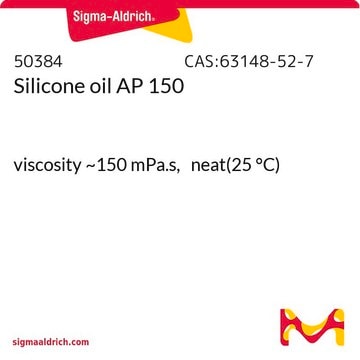175633
Silicone oil
high temperature
Synonym(s):
Poly(dimethylsiloxane-co-methylphenylsiloxane)
Sign Into View Organizational & Contract Pricing
All Photos(1)
About This Item
Linear Formula:
[Si(CH3)2O]x[Si(CH3)(C6H5)O]y
CAS Number:
MDL number:
UNSPSC Code:
12352100
PubChem Substance ID:
NACRES:
NA.21
Recommended Products
vapor pressure
<5 mmHg ( 25 °C)
Quality Level
parameter
−40-450 °F temp. range (−40-230 °C)
refractive index
n20/D 1.495
density
1.05 g/mL at 25 °C
SMILES string
C[Si](C)=O.C[Si](=O)c1ccccc1
Looking for similar products? Visit Product Comparison Guide
Related Categories
General description
Silicone oil is a highly viscous oil made up of poly(dimethylsiloxane-co-methylphenylsiloxane) chains.
Application
Silicone oil has been used as a medium component in containerless protein crystallization techniques which do not require contact with a solid surface. It was used as an oil bath during the synthesis of methyl 2-methylazulene-1-carboxylate.
Storage Class Code
10 - Combustible liquids
WGK
WGK 3
Flash Point(F)
437.0 °F - closed cup
Flash Point(C)
225.00 °C - closed cup
Personal Protective Equipment
dust mask type N95 (US), Eyeshields, Gloves
Choose from one of the most recent versions:
Already Own This Product?
Find documentation for the products that you have recently purchased in the Document Library.
Customers Also Viewed
Colloidal ordering from phase separation in a liquid-crystalline continuous phase.
Loudet J-C, et al.
Nature, 407(6804), 611-613 (2000)
Viscous liquid film flows over a periodic surface.
Trifonov YY.
International Journal of Multiphase Flow, 24(7), 1139-1161 (1999)
Jennifer Li et al.
The European journal of neuroscience, 34(12), 1983-1996 (2011-12-14)
Neuronal activity elicits metabolic and vascular responses, during which oxygen is first consumed and then supplied to the tissue via an increase in cerebral blood flow. Understanding the spatial and temporal dynamics of blood and tissue oxygen (To₂) responses following
Hui-Ling Cao et al.
Acta crystallographica. Section D, Biological crystallography, 69(Pt 10), 1901-1910 (2013-10-09)
High-quality crystals are key to obtaining accurate three-dimensional structures of proteins using X-ray diffraction techniques. However, obtaining such protein crystals is often a challenge. Several containerless crystallization techniques have been reported to have the ability to improve crystal quality, but
Donald D Nolting et al.
Nature protocols, 4(8), 1113-1117 (2009-07-21)
Azulene has been recognized for its application in medicinal therapy against inflammation. Recently, azulene analogs have been used in optical technology. Nevertheless, synthesis of this family of compounds is always associated with multiple challenges. In this protocol, we describe a
Our team of scientists has experience in all areas of research including Life Science, Material Science, Chemical Synthesis, Chromatography, Analytical and many others.
Contact Technical Service






